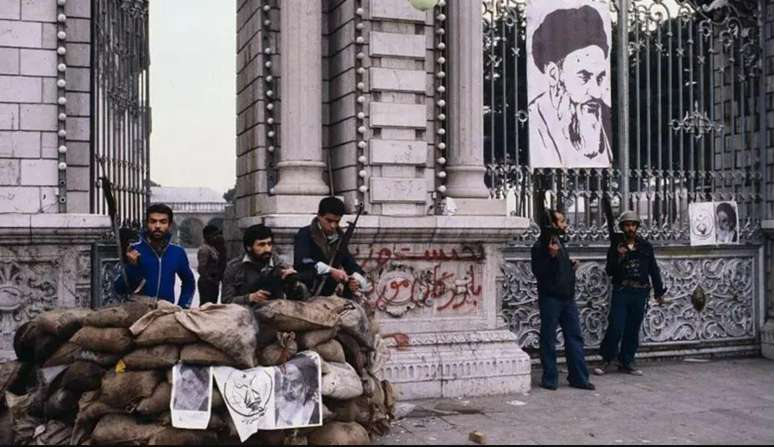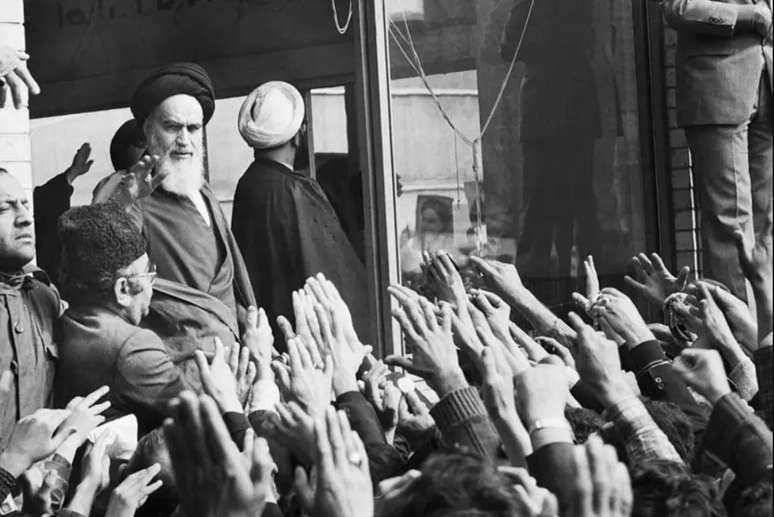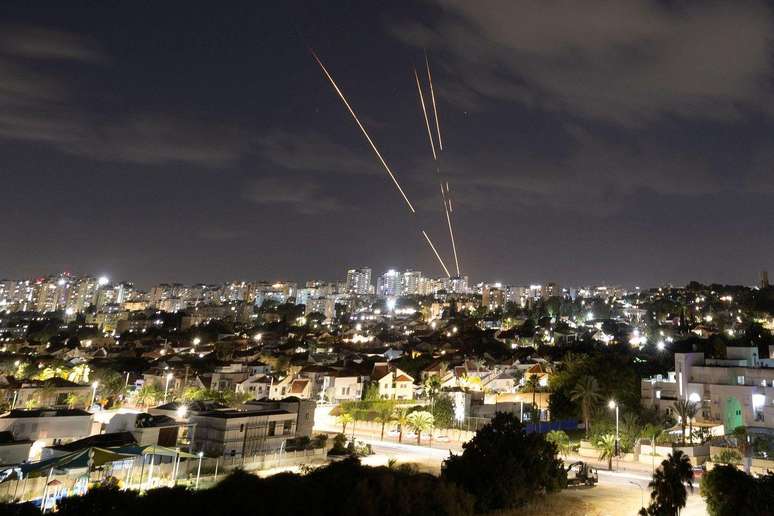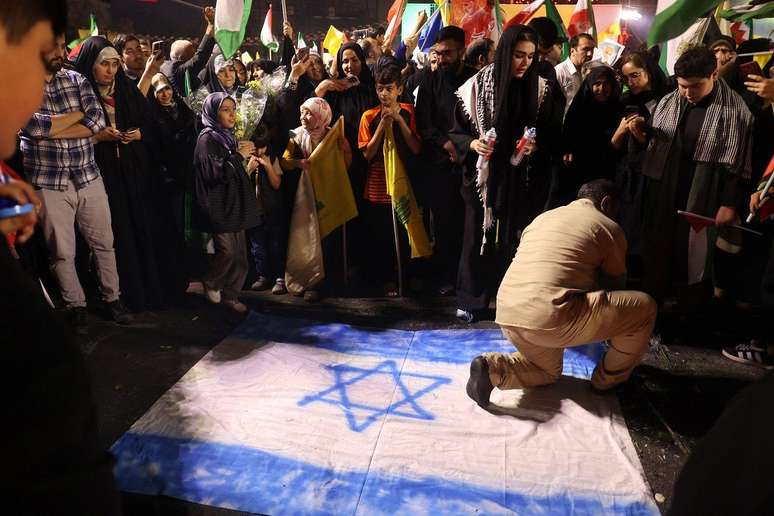Relations between Israel and Iran were quite cordial until 1979; later, the countries entered a “shadow war”.
Iran’s attacks on Israel this Tuesday (01/10) are the latest episodes of an old rivalry between the two countries.
Israel and Iran have been involved for years in a bloody dispute that has become one of the main sources of instability in the Middle East and whose intensity varies depending on the geopolitical moment.
For Tehran, Israel has no right to exist. Iranian rulers consider the country the “little Satan” – the US ally in the Middle East, which they call the “great Satan”.
Israel accuses Iran of financing “terrorist” groups and carrying out attacks against its interests, driven by the anti-Semitism of the ayatollahs.
The rivalry between the “bitter enemies” has already caused large numbers of casualties, often in covert actions in which neither government admits responsibility.
And the war in Gaza has only made things worse.
How the rivalry between Israel and Iran began

Relations between Israel and Iran were quite cordial until 1979, when the so-called Islamic Revolution of the ayatollahs took power in Tehran.
Although it opposed the plan to partition Palestine that led to the creation of the State of Israel in 1948, Iran was the second Islamic country to recognize Israel, after Egypt.
Iran was a monarchy in which the Shahs of the Pahlavi dynasty reigned and was one of the main allies of the United States in the Middle East.
Thus, Israel’s founder and first head of government, David Ben-Gurion, sought and received Iranian friendship as a way to combat its Arab neighbors’ rejection of the new state.
But Ruhollah Khomeini’s Revolution, in 1979, overthrew the Shah and imposed an Islamic republic which presented itself as the defender of the oppressed and its main characteristics were the rejection of American “imperialism” and Israel.
The new ayatollah regime broke off relations with Israel, stopped recognizing the validity of its citizens’ passports and took possession of the Israeli embassy in Tehran to hand it over to the Palestine Liberation Organization (PLO), which was then leading the struggle for a Palestinian community. state, against the Israeli government.
Alí Vaez, director of the Iran Program at the International Crisis Group, a think tank, told BBC News Mundo, the BBC’s Spanish-language service, that “aversion to Israel has been a pillar of the new Iranian regime because many of its leaders had trained and participated in guerrilla warfare with the Palestinians in places like Lebanon and had great sympathy for them.”
Furthermore, according to Vaez, “the new Iran wanted to present itself as a pan-Islamic power and raised the Palestinian cause against Israel, which the Arab-Muslim countries had abandoned”.
Thus Khomeini began to claim the Palestinian cause as his own. And large pro-Palestinian demonstrations, with official support, have become commonplace in Tehran.
Vaez explains that in Israel “hostility towards Iran began only later, in the 1990s, because previously Saddam Hussein’s Iraq was perceived as a greater regional threat.”
So much so that the Israeli government was one of the mediators who made the so-called Iran-Contra possible, the program through which the United States diverted weapons to Iran, to use them in the war against neighboring Iraq, between 1980 and 1988.
But over time, Israel began to see Iran as a major threat to its existence. And the rivalry between the two has gone from words to deeds.

A “war in the shadows”
Vaez recalls that the Iranian regime also faced Saudi Arabia, another major regional power, and was aware that Iran is Persian and Shiite – in an Islamic world that is mostly Sunni and Arab.
“The Iranian regime realized its isolation and began to develop a strategy aimed at preventing its enemies from one day attacking it on its own territory,” explains the expert.
Thus, a network of organizations aligned with Tehran has proliferated and conducted armed actions favorable to its interests.
The most important is the Lebanese Hezbollah group, considered terrorist by the United States and the European Union. Today, Iran’s so-called “axis of resistance” extends across Lebanon, Syria, Iraq and Yemen.
Israel has not stood idly by, trading attacks and other hostile actions with Iran and its allies, often in other countries, where it funds and supports armed groups fighting pro-Iranians.
The state of relations between Iran and Israel has been described as a “shadow war”, in which both have attacked each other without, in many cases, either government officially admitting their participation.
In 1992, the Islamic Jihad group, close to Iran, attacked the Israeli embassy in Buenos Aires, resulting in 29 deaths.
Shortly before, Hezbollah leader Abbas al-Musawi was assassinated in an attack widely blamed on Israeli intelligence.
It has always been an obsession for Israel to undermine Iran’s nuclear program and prevent the day when the ayatollahs will have nuclear weapons.
In Israel, the Iranian nuclear program is not believed to have only civilian purposes. And it is widely believed that it was Israeli services, in collaboration with the United States, that developed the Stuxnet computer virus, which caused serious damage to Iranian nuclear facilities in the first decade of the 2000s.
Tehran has also denounced Israeli intelligence as responsible for attacks against some of the key scientists responsible for its nuclear program.
The most notorious case was the 2020 murder of Mohsen Fakhrizadeh, considered the main perpetrator of the program. But the Israeli government has never accepted the accusation of being involved in the deaths of the Iranian scientists.
Israel, along with its Western allies, accuse Iran of being responsible for drone and rocket attacks on its territory in the past, as well as having carried out several cyberattacks.
Another source of conflict was the civil war that broke out in Syria in 2011.
Western intelligence points out that Iran has sent money, weapons and trainers to support President Bashar Al-Assad’s forces against insurgents seeking to overthrow him.
This has raised alarm in Israel, which believes neighboring Syria is one of the main routes through which the Iranians send weapons and equipment to Hezbollah in Lebanon.
According to the American intelligence portal Stratfor, both Israel and Iran have carried out actions in Syria aimed at dissuading the other from launching a large-scale attack.
In 2021, the “shadow war” reached the sea when Israel named Iran responsible for attacks on Israeli ships in the Gulf of Oman. And Iran, in turn, accused Israel of attacking its ships in the Red Sea.
Chain reaction

Following the October 7, 2023 attacks by Hamas against Israel and the massive military response launched by the Israeli army in Gaza, analysts and governments around the world have expressed concern that the conflict could cause a chain reaction in the region – and an open and direct confrontation between the Iranians and the Israelis.
On April 1 this year, an Israeli airstrike against the Iranian consulate in Syria killed two high-ranking generals.
In what appeared to be retaliation, Iran attacked Israel with drones and missiles on April 13.
Now, on Tuesday, Iran’s Revolutionary Guard described the missile attack as retaliation for the July assassination of Hamas leader Ismail Haniyeh, as well as Hezbollah leader Hassan Nasrallah, on Friday (9/27) – and also for the murder of Lebanese and Palestinians.
In Lebanon, the conflict with Hezbollah intensified in mid-September, when there were explosions of pagers and walkie-talkies used by Hezbollah, killing more than 30 people and leaving more than 2,000 injured.
Israel was accused of the action, but did not deny or confirm authorship.
A few days later, southern Lebanon began to be heavily bombed by Israel.
Lebanese authorities say more than 1,000 people have been killed in the past two weeks in Israeli attacks and up to 1 million people have been forced to flee their homes.
This text was originally published on April 8, 2024, and republished on October 2, 2024 with updates.
Source: Terra
Rose James is a Gossipify movie and series reviewer known for her in-depth analysis and unique perspective on the latest releases. With a background in film studies, she provides engaging and informative reviews, and keeps readers up to date with industry trends and emerging talents.








